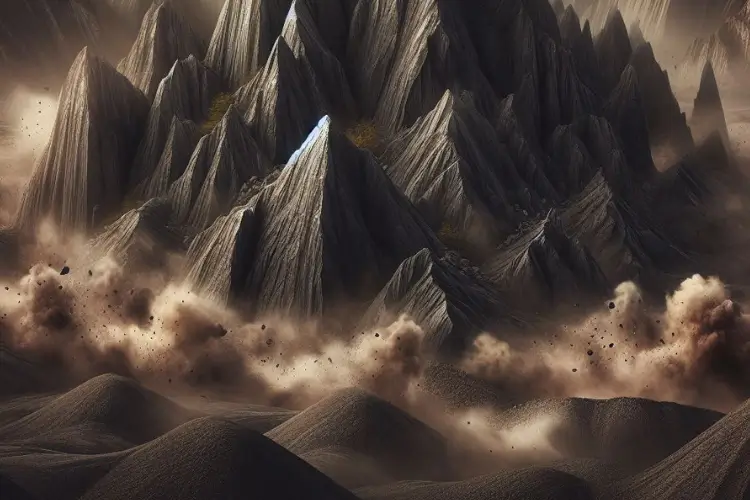Some physical and chemical factors can increase the speed of the chemical reaction of rocks in the soil.
Rocks will break into smaller pieces fast where more eroding factors affect the rocks.
We will discuss the crucial natural forces that can affect the rocks.
What Two Factors Speed up Rates of Chemical Reaction and Weathering in Rocks and Soils?
Natural forces and mineral composition are two factors that can increase the rates of weathering in the rocks. When the rocks face fluctuating temperatures and pressure, they will degrade rapidly. The low density of the mineral can also increase the speed of weathering. Weathering is faster in the rocks with low hardness due to low mineral density.
Hundreds of other factors can speed up the rates of chemical reactions.
You can think about the physical factors in the rock weathering also.
Minerals are like all the other chemicals.
They resist some changes because of hardness and allow some changes due to chemical structure.
Rocks can face many chemical and physical factors in the soil.
The chemical reaction is faster when the rocks are near a volcano or deep layers of the earth.
High temperatures give molecules enough energy to combine and start a chemical reaction.
Pressure works in the same way as temperature.
Some chemical reactions only take place at a higher pressure.
The presence of water in the area is also a crucial factor.
Water can cause physical weathering in many ways.
Water moves the rocks in the stream as they break and collide with other rocks.
Frost wedging converts the large rocks into small ones.
When they get smaller, more surface area exposes to the chemicals in nature.
It will also increase chemical relations.
Some rocks cannot withstand water damage due to high solubility.
The rates of chemical reactions and weathering give crucial information about the rocks and minerals.
Let’s Make a Definition of the Most Important Terms
It is better to know the essential terms to understand the concepts of rock weathering effects.
You will learn all the concepts better with chemical reaction and weathering definitions.
What Is a Chemical Reaction?
A chemical reaction is a process that involves the movement of an atom or molecules from one chemical structure to the other.
You will get different products as a result of the chemical reactions.
All the minerals or molecules are known as reactants in a chemical reaction.
The chemical reaction will change the reactant to a new product.
The mineral will not stay the same after the chemical reaction also.
We can take the example of one of the most common objects on the eath’s surface.
When you combine the silicates with the water, you will get water with clay.
Some water will become part of the silicate molecules during the chemical reaction, and some will stay the same due to excessive water availability.
Water can also act as an agent of transportation.
When the rocks break into smaller pieces due to water damage, they will move faster as agents of transportation require less force to move them.
What Is Weathering?
Weathering is a rock breakdown process due to the influence of natural forces as it breaks down rocks into small pieces leading to the formation of softer substances.
Soil and clay are the soft substances that form as a result of weathering of the rocks.
Some rocks also convert to more water-soluble forms.
They will not form clay but dissolve in the water to form a mineral solution.
Rocks are most secure in the tectonic plates.
When the tectonic plates move, they make faults.
They create areas of weakness along the fault lines to expose the rocks to natural forces.
Different substances can enter the fault lines due to the spaces between them.
It starts the weathering process.
Snow, water, and wind can take this rock far from the mother rock.
It will increase the rates of weathering.
It is a peculiar process as mountains can become flat over time due to weathering.
You can classify weathering into two types to understand it better.
When the molecules of the rocks react with the water of some external molecules to form something new that damages the rock structure, it is known as chemical weathering.
Physical weathering is the process of breakdown of the rocks due to physical forces.
Ice wedging, water erosion, and glacier erosion can increase the rate of water damage to the rocks.
What Factors Can Speed Up the Rate of Weathering and Chemical Reactions?
You see mountains every day without any changes because the chemical reaction and weathering is a slow process.
It takes thousands of years to change the rock structure.
If you have some environmental factors, this reaction will take less time.
It is due to the increase in the molecule energy in the rocks.
When molecules and atoms have more kinetic energy, they will combine due to collision.
You will find the most frequent factors that can make the rock’s chemical reactions faster.
1. Carbon Dioxide and Oxygen Can Speed Up the Rate of Weathering and Chemical Reactions
The living organisms on the earth use oxygen and carbon dioxide for photosynthesis, digestion, combustion, and oxidation reactions.
Rocks can also undergo oxidation reactions due to the abundance of oxygen in the rocks.
When the rocks come in contact with the oxygen in the air, they will face an oxidation reaction to form more water-soluble molecules.
Most rocks contain iron as it gives color to the minerals in the rocks.
Oxygen can combine with metals to form metal oxides.
Oxygen combines with metals and shares electrons to form strong bonds.
This process is known as rusting.
It will allow the water to dissolve a part of the rocks to cause rock weathering.
When the rocks are in the water, oxygen will not reach them faster.
Carbon dioxide can dissolve in the water to form an acidic solution.
It increases the chemical reaction of the rocks in the water.
2. Minerals Can Speed Up the Rate of Weathering and Chemical Reactions
Mineral structure and chemical composition is the crucial factor in chemical weathering.
Some rocks will react chemically with the water and other molecules due to some chemical properties.
Feldspar is the most abundant mineral on the earth’s surface.
You can find it in the granite easily.
Some parts of the granite consist of feldspar.
Feldspar reacts faster with the other chemicals than granite.
If you have a block with granite and feldspar, the feldspar will cause the rock to break due to faster weathering.
Water solubility also affects the minerals.
Halite is a mineral made from sodium and chloride atoms. It dissolves in water faster.
Halite will dissolve in water within hours. Some silica molecules are in isolated form.
They will undergo chemical reactions more rapidly than the molecules in the chain form.
Other Factors that Speed Up the Rate of Weathering and Chemical Reactions
These are not all the factors that can influence the rate of a chemical reaction in the rocks.
Many other small factors can increase the reaction speed.
You will find details of these factors also.
It is better to know the details to learn more about rock weathering.
Climate Can Speed Up the Rate of Weathering and Chemical Reactions
It is the most crucial factor in rock weathering after the temperature, pressure, and mineral composition.
Climate is a determining factor because it affects the environmental temperature and controls water availability.
Water is the most crucial chemical in the weathering process and chemical reactions.
Climate decides if the water stays in the liquid or solid form.
You will see more chemical weathering when the water is in liquid form.
The physical weathering is prominent when the water is in solid form.
Climate decides the temperature of an area.
If the climate is hot, it will increase the chemical reaction rate in the rocks.
Some plants can also grow roots inside the rocks to break them.
Climate decides the types of plants in an area.
You will see more chemical and physical weathering in tropical forests.

